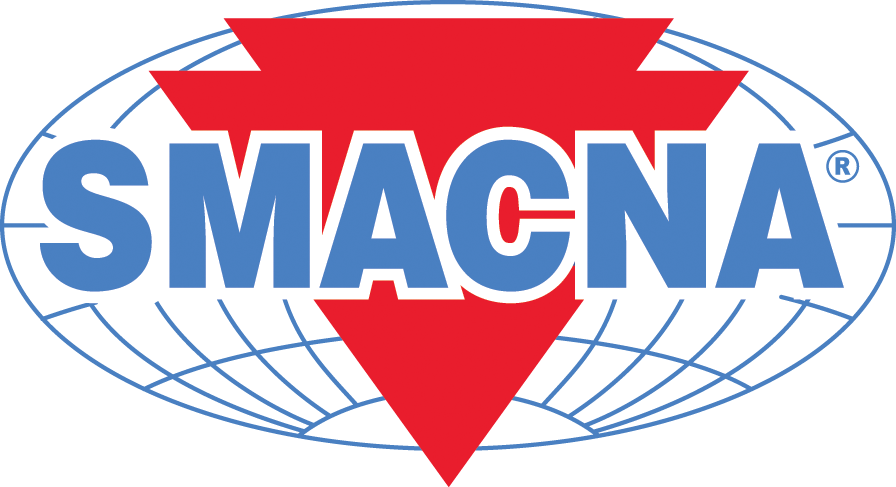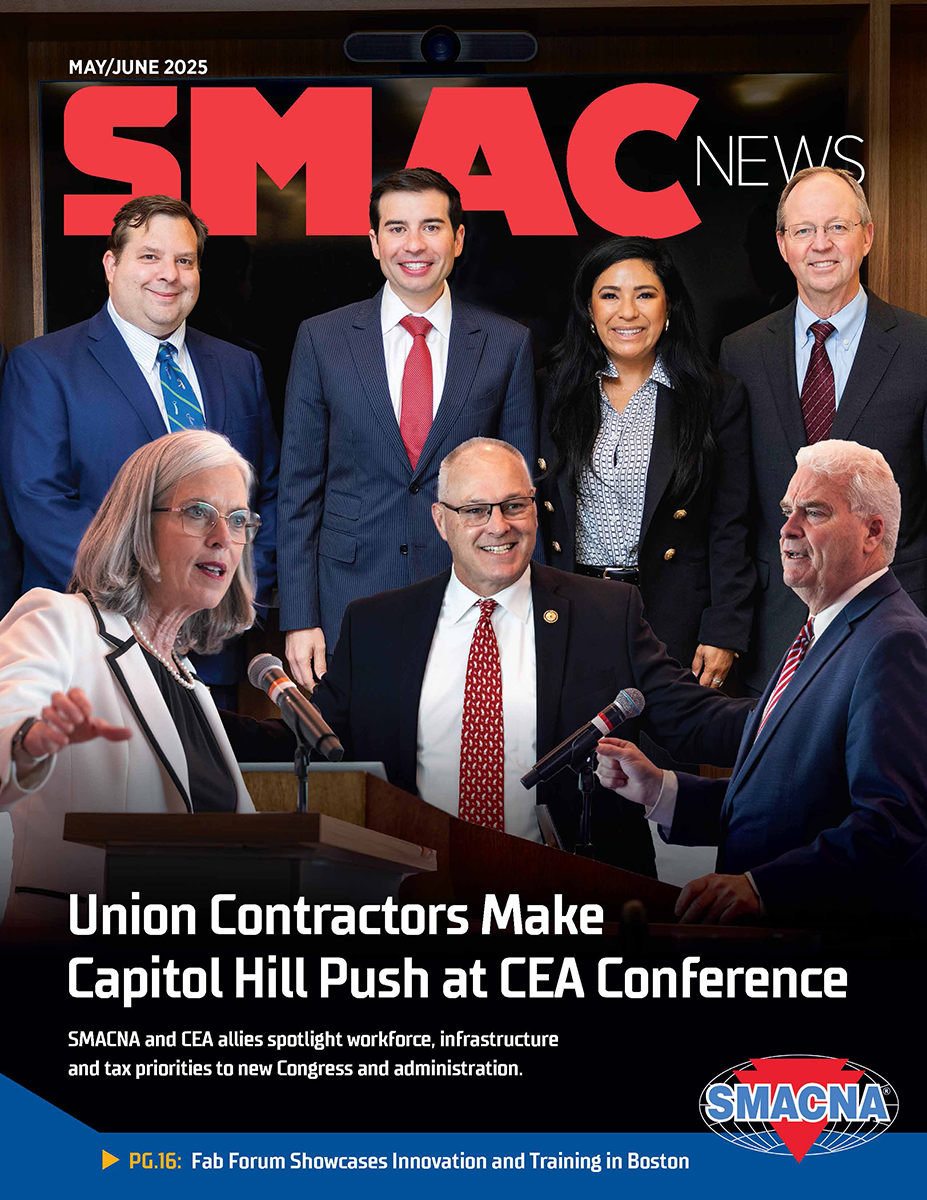Union Contractors Make Capitol Hill Push at CEA Conference
SMACNA and CEA allies spotlight workforce, infrastructure and tax priorities to new Congress and administration
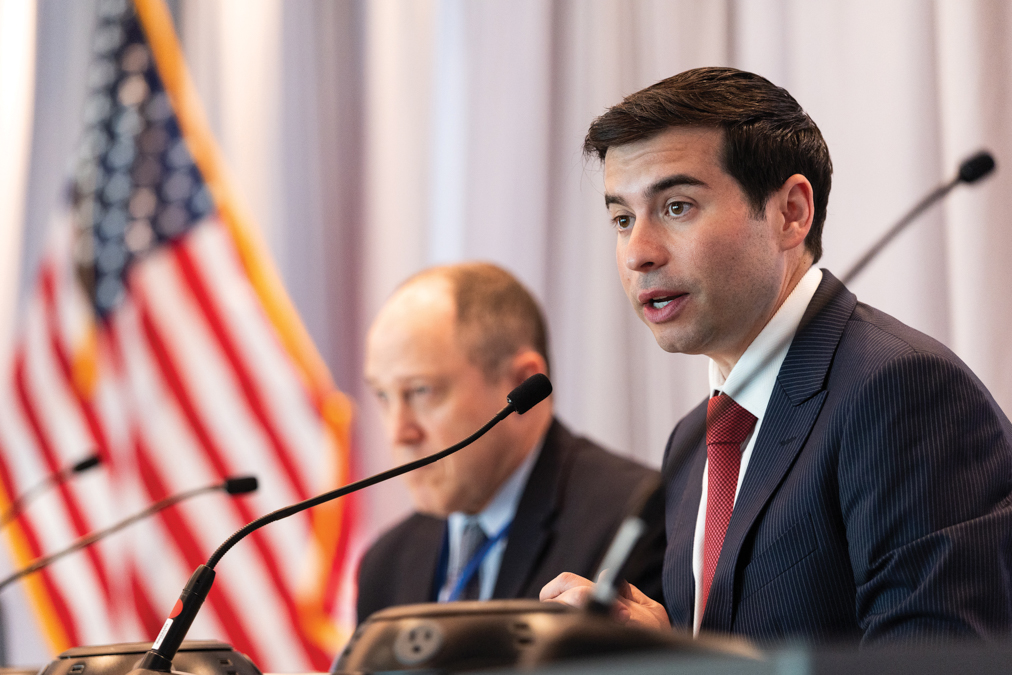 A tradition like no other: SMACNA representatives descended into Washington, D.C., for the latest edition of the Construction Employers of America (CEA) National Issues Conference.
A tradition like no other: SMACNA representatives descended into Washington, D.C., for the latest edition of the Construction Employers of America (CEA) National Issues Conference.
Over many years, the CEA has brought together some or all member groups to share the industry message with Members of Congress and the top administration officials. SMACNA, MCAA, TAUC and several other CEA members assemble each spring to learn more about the pressing legislative and political issues facing the union construction industry and engage with Members of Congress and their staff. The purpose of the CEA Washington Conference is simple: to steer policy questions that impact our members on an important collection of our top priorities, including workforce development, public sector contracting, procurement reform, business tax incentives, and much more.
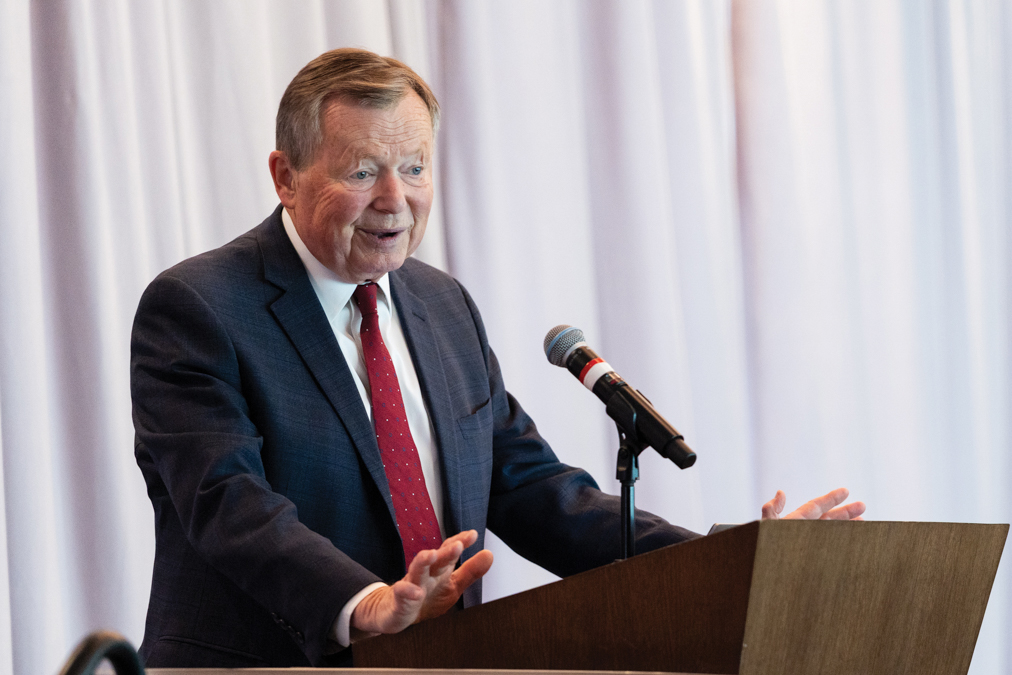
This year's event took on added significance due to a new 119th Congress to educate and countless new appointments to brief in a changed administration. With any administration change, there are many new policy opportunities and many new advocacy challenges. However, SMACNA and its CEA allies prepare for every CEA Washington Conference visit to elevate our members' issues nearer the top of the congressional and administration agenda for active consideration. The game plan is to make our industry's voice heard loud and clear.
This year's conference was again chaired by former Congressman Earl Pomeroy (D-ND). Pomeroy, a long-time champion of our industry in Congress, represented North Dakota until 2011 before becoming senior counsel at Alston & Bird for over a decade. Pomeroy once again demonstrated why he is respected throughout the union construction industry and by members of Congress on both sides of the political aisle.
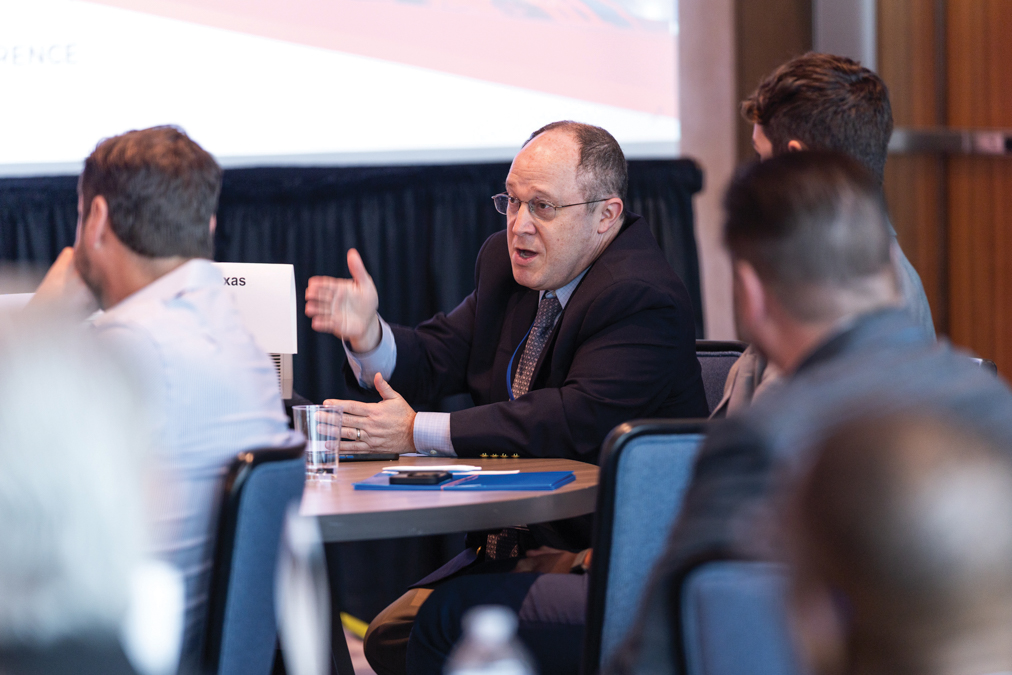
The Monday session was opened with a fireside chat featuring Deputy Secretary of Labor Keith Sonderling. The deputy secretary has a long and distinguished career of federal agency service and policy involvement on labor-management issues. From 2020 to 2024, Sonderling served as U.S. Equal Employment Opportunity Commission commissioner. Before that service, from 2017 to 2020, he served as the deputy and acting administrator of the Wage and Hour Division of the United States Department of Labor. As the Deputy Secretary, Sonderling functions as the Department's Chief Operating Officer. During his remarks, the Deputy Secretary highlighted a recent executive order seeking to expand apprenticeship opportunities. "We're looking to move past the 'you have to go to college' model," said Sonderling, offering the idea that the administration was looking to create over one million apprenticeships across the entirety of the skilled trades. "This is a lofty goal for sure, but it's one that we are hoping to have the industry's support for."
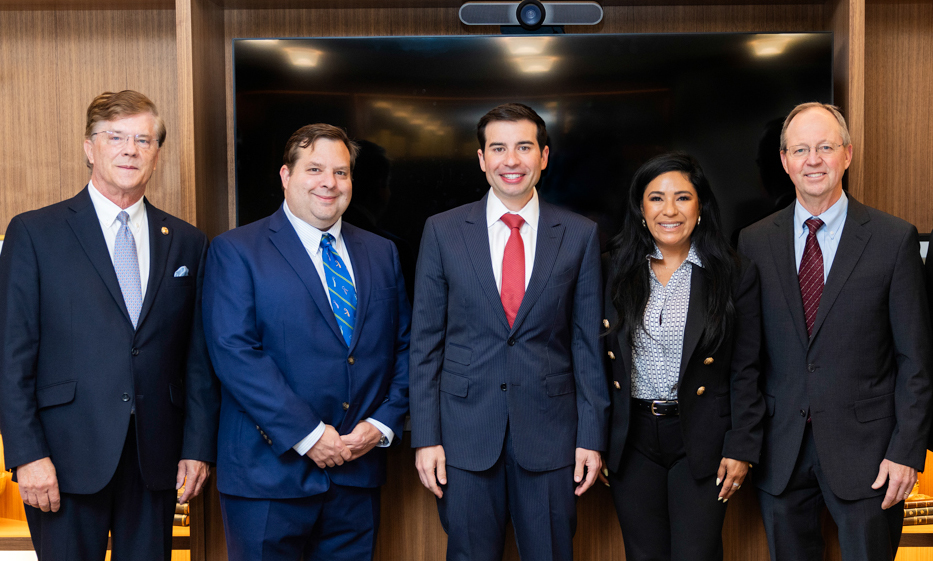
Following Sonderling was David Gardiner from the Combined Heat and Power Alliance. Gardiner, who has earned appointments at the executive level of government dating from the Clinton administration, detailed why there is a growing need to expand industrial energy efficiency by providing tax and program support for combined heat and power energy systems. He cited two developing areas of need within the nation's infrastructure: growing domestic manufacturing and the ever-increasing footprint of data centers nationwide. Gardiner emphasized that the combined heat and power infrastructure must expand, considering the rise of artificial intelligence and its requisite energy and data capacity needs. Gardner was direct in the importance of contractors in this process. "The people in this room are critical in meeting this skyrocketing demand. You are at the forefront of helping meet the needs of our ever-evolving marketplace."
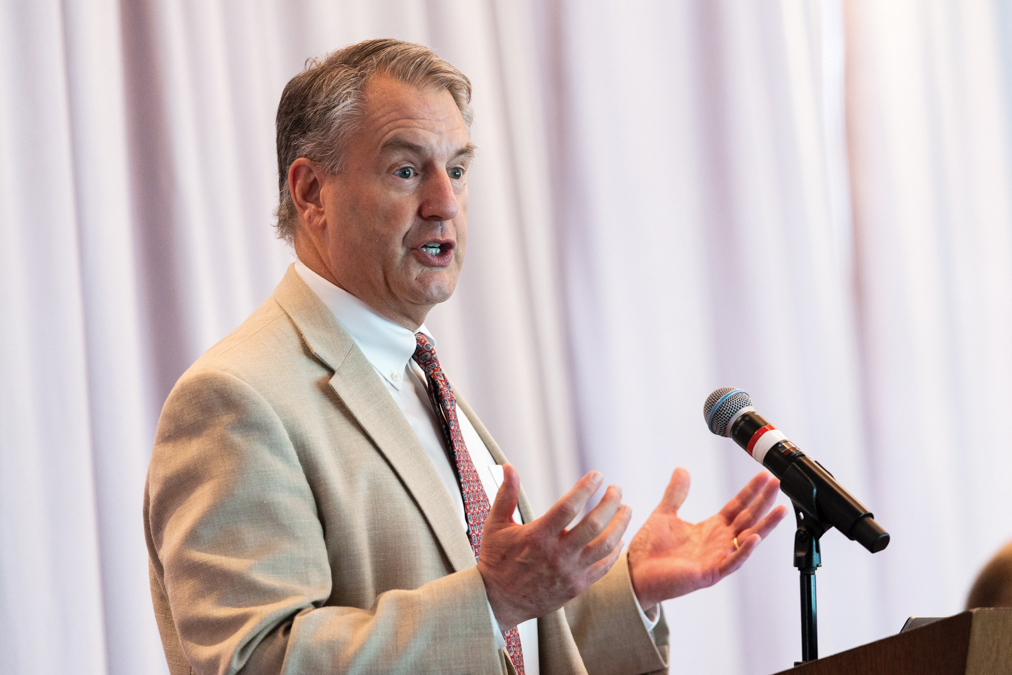
With tariffs on the minds of every CEO in attendance, John G. Murphy from the U.S. Chamber of Commerce outlined the opinion of the Chamber of Commerce, which is firmly opposed to the administration's tariff policies. Murphy highlighted the Chamber's arguments about how tariffs negatively impact foreign exports, trade balances and manufacturing throughout the United States. He also focused on how potential tariff retaliation by allies and adversaries could further harm the nation's economy. His presentation also outlined how Canada produces a significant margin of the aluminum consumed by U.S. firms. This fact results from Canada's widespread access to inexpensive hydroelectric power. Murphy also pointed to polling data that overwhelmingly indicated Americans are fearful and unsettled about the overall economic picture. Murphy further emphasized how Americans are concerned they will see growing inflation and a recession in the months ahead. He also pointed to declining consumer sentiment and heightened stress in the bond market. Murphy concluded that it is still unclear if the administration's use of tariffs was designed as a bargaining strategy or a permanent revenue-raising tactic in long-term economic policy.
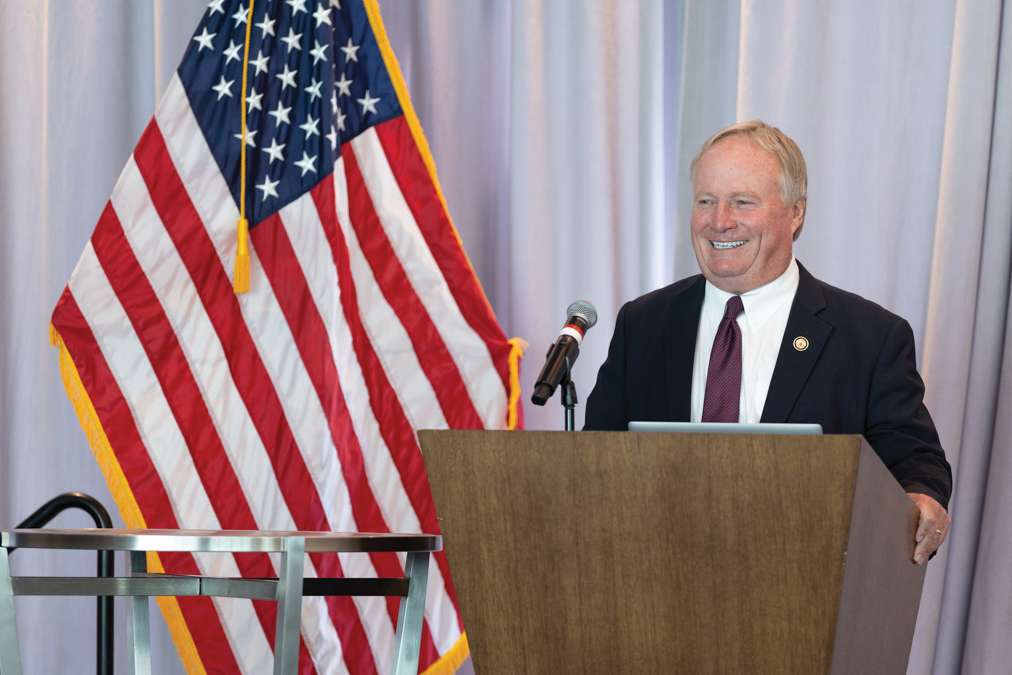
The first in the long list of leading congressional speakers was Representative John Garamendi (D-CA-8), who addressed CEA attendees on the critical issue of infrastructure investments. Garamendi, who sits on the House Armed Services and Transportation and Infrastructure Committees, lauded the efforts of the construction sector: "Major construction projects and programs are the lifeblood of our nation, and everyone here is responsible for building that foundation." He also urged everyone in the room to be direct and honest during their meetings with lawmakers on the Hill, "You need to be crystal clear with Congress about what you are seeing in front of you, you need to detail to them exactly the pain you are going through at this very moment."
Next on the issue-packed agenda was Philadelphia area Congressman Brendan Boyle (D-PA-2). Boyle is an influential voice in Congress on fiscal issues, with assignments on the Committee on Ways and Means and the House Budget Committee, where he serves as a ranking member. Boyle talked about the reconciliation process and where the Congress stood, quoting Yankees legend Yogi Berra, saying, "It gets late early." He spoke a little about the mechanics of the reconciliation process. He clarified that he wanted to work with the GOP, where possible, on tax and spending priorities in the quickly developing budget package. He also warned that many businesses and contractors in his district are holding up making important hiring and investment decisions because they were unsure about where this tariff and reconciliation process would end up.
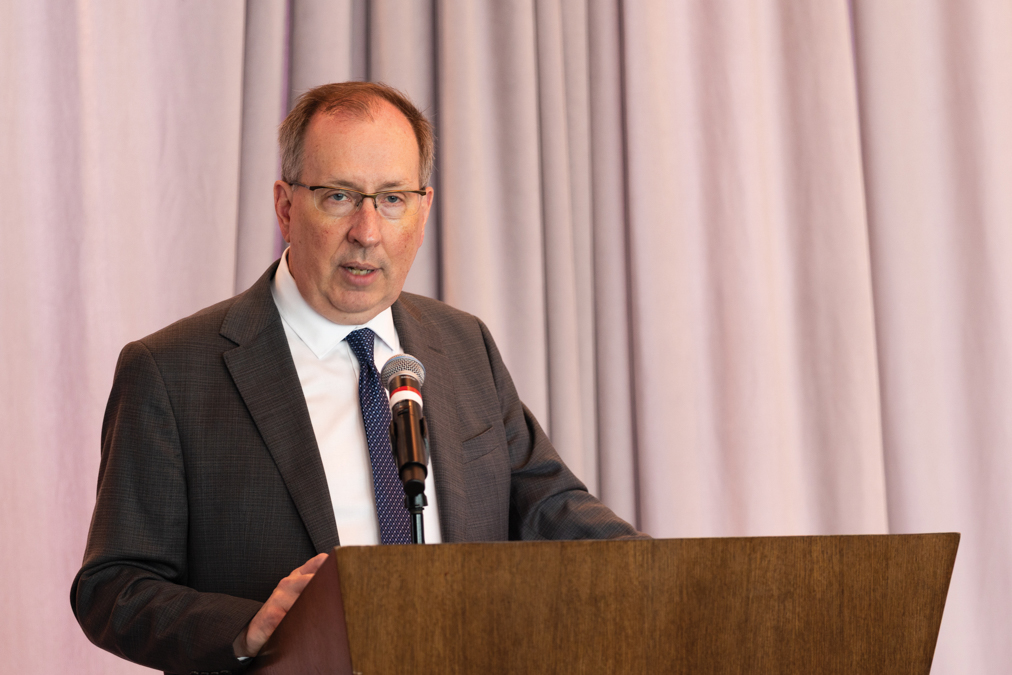 The attendees were most fortunate to hear from the House Minority Whip Katherine Clark (D-MA-5) on the first day and House Majority Whip Tom Emmer (R-MN-6) on the conference's second day. Clark, who represents suburban communities surrounding Boston, echoed several of the remarks made by her colleagues from the Democratic caucus. "No matter your ideological leaning, everyone wants a sense of certainty of where the economy is going … you want to be in a position where you can plan out your life to a point that goes beyond one news cycle." She concluded her remarks by telling attendees, "You need to be put in a position to do what you do best … build."
The attendees were most fortunate to hear from the House Minority Whip Katherine Clark (D-MA-5) on the first day and House Majority Whip Tom Emmer (R-MN-6) on the conference's second day. Clark, who represents suburban communities surrounding Boston, echoed several of the remarks made by her colleagues from the Democratic caucus. "No matter your ideological leaning, everyone wants a sense of certainty of where the economy is going … you want to be in a position where you can plan out your life to a point that goes beyond one news cycle." She concluded her remarks by telling attendees, "You need to be put in a position to do what you do best … build."
Pomeroy said, "Everyone in this room is the best at what they do. Members of Congress would be well served to listen to what you have to say." Agreeing with Pomeroy, SMACNA member Todd Byxbe of Miller Engineering Co., boosted Pomeroy's sentiment, "We are the subject matter experts, but we are also constituents. We can build relationships with members of Congress and their staff and take the lead in forming the policy that will shape the future of everyone involved in our industry."
The CEA attendees wrapped day one of the educational sessions by welcoming Jim Brewer, Director of Legislative Affairs for North America's Building Trades Union (NABTU). Brewer brought greetings from the organization's president, Sean McGarvey, who could not attend this year's conference. He thanked union contractors and CEA staff in attendance for their ongoing support for key legislative items such as registered apprenticeships, project labor agreements and prevailing wages. Brewer also talked about NABTU's priorities regarding reconciliation, focusing on protecting labor standards within the existing tax code. He went into detail about their efforts to resist Department of Defense efforts to increase exemptions that would enable specific contracts to be executed without using a project labor agreement (PLA). "PLAs are a win-win for the government, the contractor and the taxpayer — we will continue to fight for this critical tool." Brewer also noted that he and his team constantly warned lawmakers to pass on any attempt further to contract the use of PLAs in the public sector.
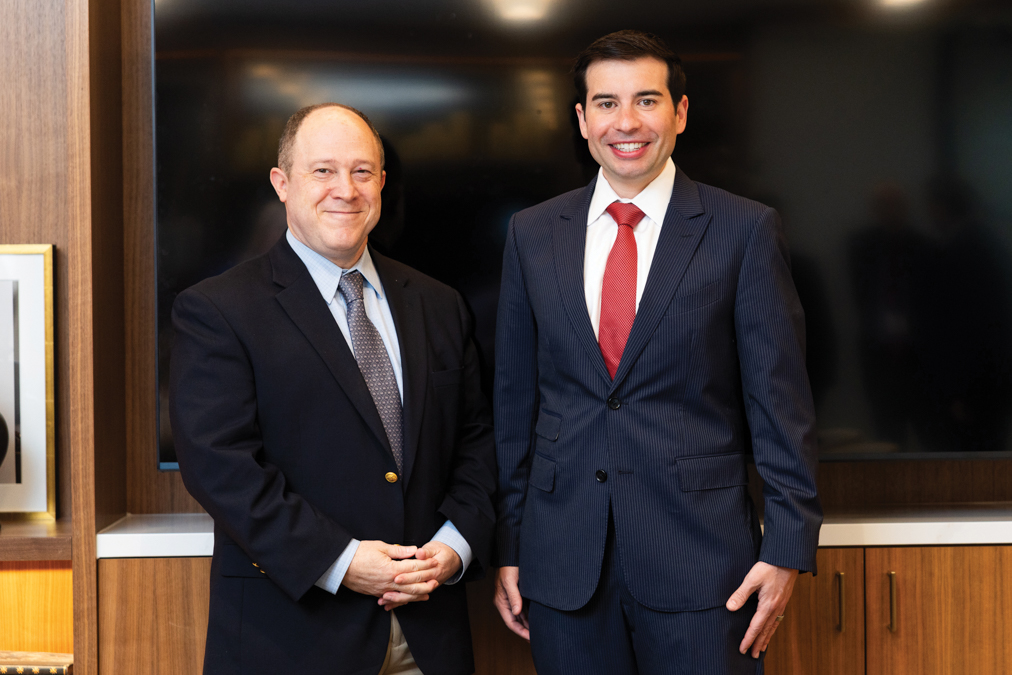 Monday afternoon, the members in attendance departed for their appointments on Capitol Hill, where they met with their elected officials in the House and Senate and their professional staff. This year's meetings proved more critically important than ever, with the uncertainty about record-level steel and aluminum and equipment tariffs and the reconciliation process front and center on the Hill agenda. Building on existing connections with staff is one of the more crucial aspects of each year's conference, and CEA was prepared to do just that. As the CEA clarifies to its conferees, congressional staff are the subject matter experts within each House and Senate office. They are often the ones who will counsel legislators on policy decisions and help them make decisions on how to vote and potentially which bills and amendments to co-sponsor. These meetings play a crucial role in this process and allow our industry representatives to educate Hill staff and members, often positively influencing lawmaking.
Monday afternoon, the members in attendance departed for their appointments on Capitol Hill, where they met with their elected officials in the House and Senate and their professional staff. This year's meetings proved more critically important than ever, with the uncertainty about record-level steel and aluminum and equipment tariffs and the reconciliation process front and center on the Hill agenda. Building on existing connections with staff is one of the more crucial aspects of each year's conference, and CEA was prepared to do just that. As the CEA clarifies to its conferees, congressional staff are the subject matter experts within each House and Senate office. They are often the ones who will counsel legislators on policy decisions and help them make decisions on how to vote and potentially which bills and amendments to co-sponsor. These meetings play a crucial role in this process and allow our industry representatives to educate Hill staff and members, often positively influencing lawmaking.
As attendees reconvened on Tuesday morning, they had the opportunity to hear from several leading members of the House Republican Conference. House Majority Whip Tom Emmer (R-MN-6) was the first to address the attendees, giving everyone an honest assessment of Congress and America's current political climate. "We are currently amid a political realignment. The parties have changed, but the issues at their core have not." Emmer detailed that his priority with the tax legislation was to bring certainty to the American business community and everyday people. "We have been operating under temporary tax policy for decades, and when one administration leaves, the next one will come in and rip it up. We must chart a course enabling Americans to make long-term decisions." Emmer also took a moment to comment on how his party can navigate its historically narrow majority: "We aim to try to give everyone at least a sense that they have a seat at the table."
Following Emmer was Representative Pete Stauber (R-MN-8). Stauber, who sits on the House Committee for Small Business and the Committee on Transportation and Infrastructure, reiterated his support for the Davis-Bacon Act and its provisions that support high-quality union labor. "I think there are a lot of people on both sides of the aisle who forget the simple fact that both Davis and Bacon were Republicans." Stauber continued, "I want to see my neighbors work in high-skilled fields that contribute to the prosperity of America while also doing something that they love." He also explained his support for strong relations with Canada and Mexico: "A strong relationship with Canada and Mexico is critical. These two countries have been some of our strongest allies and most reliable trading partners for so long. Keeping these ties is in America's best interest."
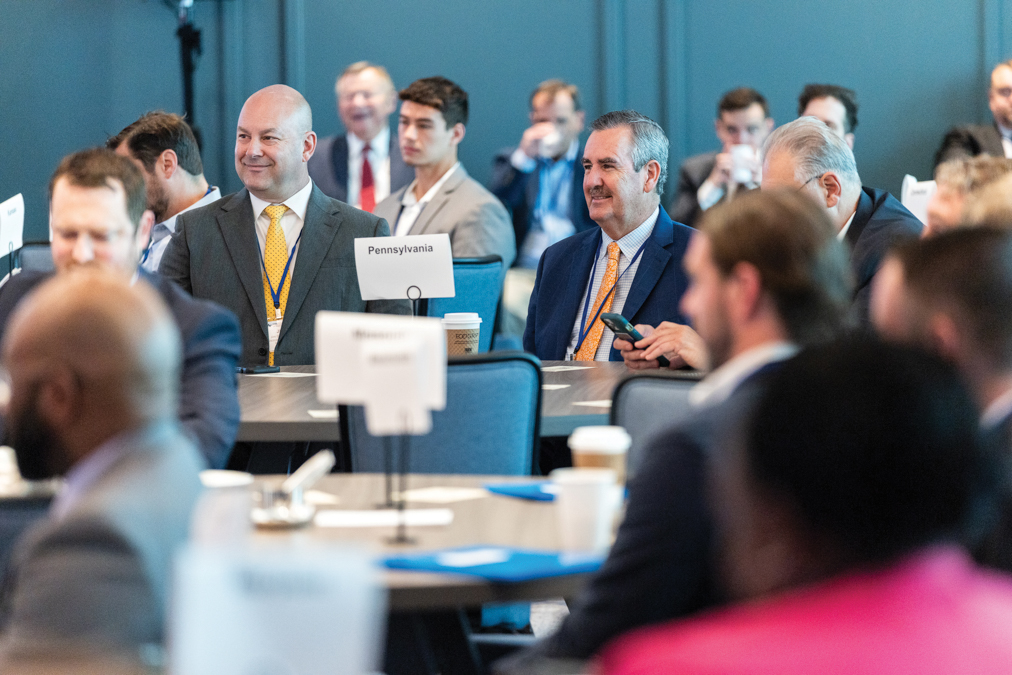
Representative David Joyce (R-OH-14), the day's final speaker and SMACNA President Tom Martin's Congressman, discussed Congress's need to get contractors the necessary resources. "It is up to us to get you the workforce you need to get the work of our country done." The congressman also talked about what he perceived as the need for permitting reform, "We cannot wait four to five years for paperwork to clear to get shovels into the ground, considering the various challenges we face at the moment, we need to be getting the clearances out of the way in a reasonable fashion that doesn't see a project bogged down by red tape."
Joyce also discussed how he felt the government needed to become more nimble and better able to react to the needs of its constituents: "We need a government that moves at the speed of business and can tackle head-on the needs of its people in a way that enables prosperity."
At the end of the three-day Conference in the Nation's Capital, attendees could see the impact of their work in conference sessions and on the Hill.
the weeks and months to following the CEA how the connections they made with their lawmakers, coupled with the contractor messaging directly to top staff and members pay off big-time. The benefits of SMACNA on issue after issue and vote after vote serve our industry and Congress.
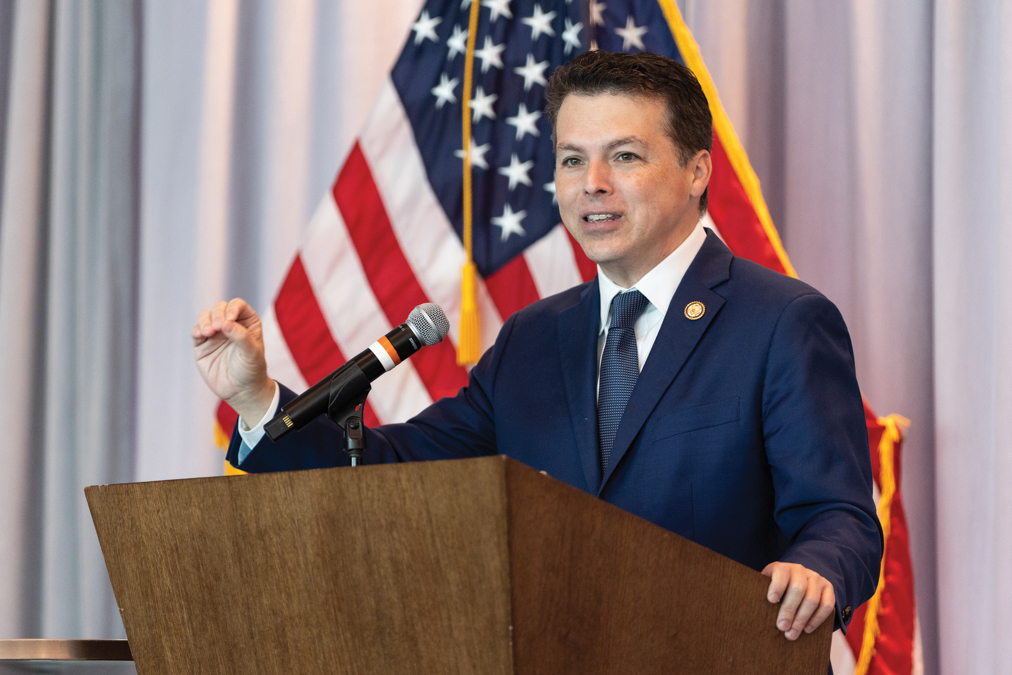
Kolbe continued, "I greatly appreciate everyone who makes the journey to Capitol Hill to share their policy views and business stories with staff and members of Congress. It is how our system works best when informed business CEOs speak contractor truth to powerful members who are often inexperienced in construction. These Hill meeting sessions are needed to support our aggressive legislative advocacy campaign and the industry's union contractor segment."
In this period of increasing uncertainty on various fronts, having a seat at the table is more important than ever. Warren Creamer of SMACNA Boston, who was attending CEA for the very first time, summarized his experience at CEA: "So many of us have been on the sidelines. We can't afford to be on the sidelines any more … unless you are getting out there and getting your message out to those who make the decisions, you will be left behind.
Published: July 9, 2025
IN THIS ISSUE
A “Good Catch” for Safety
icon Mechanical’s proactive safety approach earns SMACNA’s 2024 Safety Innovation Award.
ARCHITECTURAL: Detroit Firm Rebuilds Historic Tower’s Copper Crown
CASS Sheet Metal battles wind, weather and tricky scaffolding to restore the iconic Detroit Towers.
CAPITOL HILL UPDATE: HVAC Tax Credits on the Chopping Block in House GOP Tax Plan
In May, House Republicans unveiled their much-anticipated tax package, and the news was not great for HVAC tax credits. The 389-page bill included the repeal of two major HVAC tax credits that address residential energy efficiency improvements.
Fab Forum Showcases Innovation and Training in Boston
Sheet metal leaders gather for hands-on learning and facility tours.
Financial Resilience: Strengthen Your Scenario Planning in 2025
Halfway through 2025, and from where we all stand, contractors’ continued challenges may seem unpredictable. Material costs have fluctuated due to regulatory changes and supply chain disruptions.
HVAC: Modern Niagara Bets Big on Ottawa’s Hard Rock Casino Revamp
In a landmark project, Modern Niagara is spearheading the transformation of an aging casino in Ottawa into a cutting-edge Hard Rock Hotel & Casino.
INDUSTRIAL: How to Navigate Explosive Growth
Allied Mechanical balances industrial megaprojects with customer loyalty and long-term strategy.
Innovating, Educating and Connecting For a Stronger Future
During my travels, I emphasize to all our members: SMACNA is your association. SMACNA exists solely to promote the interests of our members and the union sheet metal/HVAC industry.
NLRB In Limbo Following the Unprecedented Removal of Member Gwynne Wilcox
In early 2025, President Trump removed Gwynne Wilcox, a Democratic appointee to the National Labor Relations Board (NLRB), despite the fact that her five-year term did not expire until 2028.
RESIDENTIAL: Flourishing in the Residential Market
Metro Air increases its residential customer base by focusing on customer service, continued employee education and cost control.
Safety First, Profits Follow
How prioritizing safety builds a more profitable and sustainable business.
Strengthening SMACNA: Engaged Members, Stronger Connections
Entering my fourth year as CEO, I have moments when I can reflect on what it means to be a part of SMACNA.
Union Contractors Make Capitol Hill Push at CEA Conference
SMACNA and CEA allies spotlight workforce, infrastructure and tax priorities to new Congress and administration
Welcome New SMACNA Members
